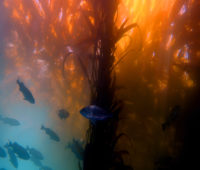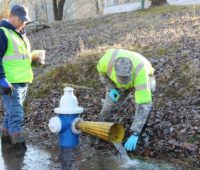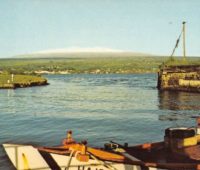Many predict that conflict over water will define the twenty-first century as human populations climb, consumption increases, economic insecurity mounts, and climate change destabilizes existing patterns of water supply and demand. Often, the projects and organizations seeking to mitigate these impending conflicts operate as if there were only one right way to experience, imagine, use, and share water—to “do water,” one might say. When water is framed as a limited resource, its singular nature increasingly appears self-evident and universal, and it becomes easy to believe that all water is “one water”: a chemical compound (H2O) whose properties are the same no matter where it is found or what transformations it has undergone along its path. By conceptualizing water as one, these approaches seek to enable stakeholder consensus on how water should be managed as it moves from body to body through shared environments.
The members of the Ways of Water research collective agree that the world faces a water crisis with multiple origins, impending consequences, and uncertain solutions. In this context, conflict mitigation depends on bringing together people with different needs, values, experiences, and resources. However, we are skeptical of the idea that conceptualizing water as a singular, universal substance helps build consensus. Rather, we understand water as localized, situated, and embodied, where effective cooperation is a matter of braiding rather than of confluence. From this viewpoint, water is constantly slipping away from efforts at reduction.
Rather than seeking to bring all stakeholders to a shared understanding of water’s significance, the Ways of Water research collective is developing tools and methods to recognize, preserve, and even enrich the diversity of human entanglements with waters—as substances, symbols, and vital components of our environments. Doing so humanizes the often-technocratic structures inclined to reduce water to a singular, universal good for humanity as a whole, while inviting corporations, governments, and municipalities to recognize and respond to ways of valuing, understanding, and using water that they might otherwise ignore.
The essays in this series represent a sample of work from the collective. Since 2017, with the support of the SSRC’s Scholarly Borderlands initiative, our collective of scholars and practitioners has been exploring an approach to research and teaching that centers waters in specific places and relationships rather than assuming that water circulates unchanged throughout the hydrosocial cycle. This approach celebrates differences in methods and concepts rather than trying to standardize them.
In articulating our position on the multiplicity of water, we have drawn on multiple sources. Some of these are scholarly in the traditional sense; others are experiments in scholarly collaboration in the interdisciplinary borderlands, and include efforts to articulate best practices for such research; while others integrate artistic interventions and critique as well as movements of resistance and solidarity. Doing this invites diverse practices of knowing water to walk as equals alongside the still-dominant modes of calculation and management. We ask what modes of invitation and hospitality are necessary for enabling conversations about how to “do” water across difference. Such conversations, we believe, are critical to crafting just, sustainable, and diverse relationships to water(s).
We recognize that this framing sets inherent limits on our ability to draw universal conclusions, even as to method and approach. Water brings people together—but sometimes it is necessary to accept that one hasn’t been invited to the watering hole. Consequently, we accept that some questions about water and its doing must remain locally situated until further notice.
In light of these aims and limitations, the Ways of Water collective has identified several core methodological considerations as essential for encountering other people’s bodies of water: the importance of embodiment in place, intellectual modesty, and attention to power inequalities. These are principles that link our work across disciplines, practices, and political commitments. Centering these considerations bridges our significantly different textual, visual, and performative modes of investigation and action to enable collaborative creation and education. This approach is reflected in the essays in this collection, which may be seen as experiments in examining our own and others’ bodies of water in ways that are embodied, situated, modest, attentive to power and injustice, and open to water’s inherent multiplicity.
This series has been curated by Christy Spackman, assistant professor in the School for the Future of Innovation in Society and the School of Arts, Media and Engineering, Arizona State University; and Etienne Benson, associate professor in the History and Sociology of Science Department, University of Pennsylvania.



























